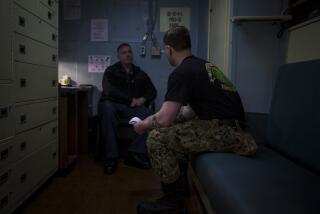Marines Face Psychic Fight of a Lifetime
- Share via
The U.S. Marines who began leaving their bases in Southern California on Wednesday for their trip to Somalia will have their reputation as the world’s elite fighting force put to a new and potentially unnerving test.
They will see human suffering so shocking to the senses that hardened Marines and psychologists say many young soldiers will be traumatized.
One Marine from the El Toro Marine Corps Air Station, Lt. Brad Bartelt, who recently returned from Somalia where he assisted in food relief efforts, said he was horrified by the death, hunger and disease.
“There is nothing that compares to the amount of death and devastation in Somalia. It’s something you have to see to believe,” Bartelt said.
“The stench from death was just overwhelming at times with that many rotting corpses just lying around,” Bartelt said. “It was sometimes unbearable.”
Bartelt was part of a 50-member Marine unit sent there before Operation Restore Hope to guard food packages flown into Somalia and Kenya.
“I don’t think anyone can be prepared for Somalia. You can see it on television or read it in magazines, but it just doesn’t sink in until you actually see it in person. It’s like hell,” Bartelt said.
Psychologists and psychiatrists say that Bartelt’s experience will be common among the thousands of troops from the Marines, Air Force, Navy and Army in Somalia.
Dr. Roger Walsh, a psychiatrist and professor at UC Irvine, said the troops will have a “global reaction” to the thousands of dead and dying Somalis.
“When they see the overwhelming suffering, particularly the women and children, it is going to be hard to see any justification,” Walsh said.
“Americans tend to have a ‘fair world’ syndrome, and it could be shattered when confronted by unmitigated suffering,” he said.
Walsh also said that there are two types of responses that will occur with the troops from the result of seeing massive death.
“Some will withdraw in a kind of defensive anger. They will find ways to avoid personal contact with the victims, maybe even blaming the victims for allowing their suffering to occur,” he said.
Another reaction, said Walsh, would find many of the troops wanting to help and later, perhaps, seeing the world differently.
“They will be wondering if there is a God and experience survival guilt,” Walsh said. “They come from a part of the world where death through neglect on a massive scale just (doesn’t) happen.”
Although not all the American service members will be affected the same way, there will be more recognition of the poor and suffering, the UCI professor said.
“The U.S. troops are part of a unique mission, one never before seen, a purely altruistic mission,” Walsh said. “It will be a very powerful experience.”
Steven L. Schandler, a professor of psychology at Chapman University, said: “The last time anyone saw death on this scale was in the Nazi concentration camps during World War II.”
Schandler said the 28,000 U.S. troops to be deployed to Somalia could react brutally if they are fired on because they are there on a mercy mission.
“If the Marines come under attack while trying to help the dying, there will be an incredibly violent reaction from them and it will be terribly vicious,” Schandler said.
“They are not over there because our country wants something. The Marines are there to give dying people food and relief, and they will extract a pound of flesh from anyone who tries to stop the good they are doing,” Schandler said. “Their frustration in seeing the death all around them will make for terrible combat if they are shot at.”
He also said seeing children die because of neglect and insensitivity by Somali gunmen may further the Americans’ feelings of frustration.
“They are going to be shocked that nothing has been done for the children, and they are going to do their best for them,” he said.
Another psychologist, Dr. Thomas Hicklin, who teaches at USC, said that the Marines are prepared for any shooting but that they are not prepared for the death and disease that will confront them in Somalia.
“They are going to be shocked by the starving masses and the amount of disease present,” Hicklin said. “There is no way to prepare for it.”
More to Read
Sign up for Essential California
The most important California stories and recommendations in your inbox every morning.
You may occasionally receive promotional content from the Los Angeles Times.










